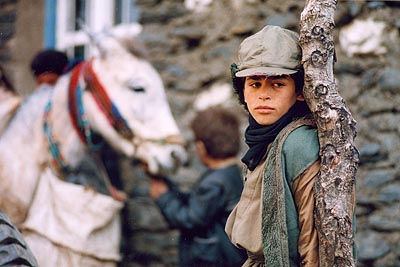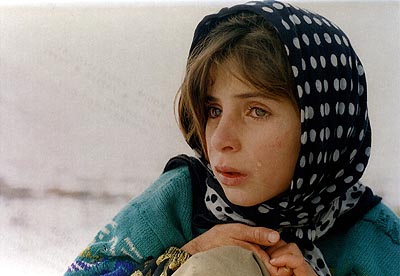

A Time for Drunken Horses is the latest film from the Shooting Gallery Series to receive wider distribution (after movies like Croupier and Judy Berlin). This movie has less in common with the other Shooting Gallery movies and more in common with the slow stream of movies coming out of Iran. These movies tend to be very allegorical, frequently starring non-actors and involving children in some sort of harsh life situation. In this movie, writer/director Bahman Ghobadi (Life in Fog) details the extreme hardship of Iraqi Kurds (who came to some prominence in the aftermath of the Gulf War). The Kurds in this movie are so desperate that they are willing to smuggle goods across a dangerous border into Iran for money.
Ayoub (Ayoub Ahmadi) is the head of his family, he is also a young child. He cares for his brothers and sisters, including sister Amaneh (Amaneh Ekhtiar-dini) and brother Madi (Madi Ekhtiar-dini). Madi has a congenital disease that stunted his growth and requires him to take multiple pills every day and as well as painful injections. Ayoub is much too young to shoulder all this responsibility, but he does. He is trying to save money for an operation for Madi, but regular living expenses are preventing him from doing this. Initially, Ayoub and Amaneh work in the city, doing small jobs for money, but eventually Ayoub takes a job transporting things across the border.
The title refers to the act of giving mules (there are no horses in the movie) alcohol so they will not notice the cold. Ghobadi effectively contrasts the stark, serene surroundings with the plight of Ayoub. No matter what he does, he always needs more money. His love for Amaneh and Madi forces him to work increasingly harder. As with the other recent Middle Eastern movies, A Time for Drunken Horses focuses less on narrative and more on the aura the movie creates. For some people, this comes across as boring. These movies are less about a story and more about the experience in total. If anything, there seems to be even less narrative here than in some of those other movies. So although Ghobadi creates a palpable sense of family and love amidst abject poverty, but this isn't enough to bring it to par with some of its peers.